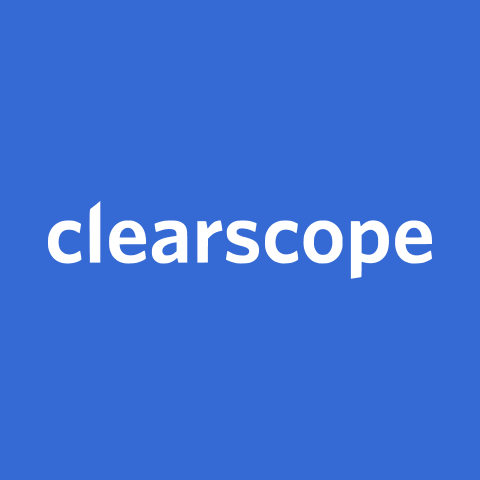
Clearscope
Clearscope is an AI-powered SEO tool that helps write and optimize content for search engines. It focuses on increasing your content’s readability and relevancy, making it more search-friendly to rank higher on search pages.
In this review, I’ll share my hands-on experience with Clearscope, assessing its strengths and weaknesses, and whether it’s worth the hype.
Features
-
Powerful AI-based content optimization tools
-
Real-time content grading system
-
Content inventory management
-
Powered by IBM Watson and Open AI
-
AI-based outline creation for updated content structure
-
Keyword discovery using Google Keyword Planner
Pros
-
Great NLP integration with consistent guides
-
No user limit on plans
-
Intuitive UI/UX for beginners
-
Easy collaborative features for larger teams
-
Smooth onboarding process
Cons
-
Low credits for plans
-
Expensive pricing plans
Clearscope Review Methodology
Geekflare tested Clearscope by analyzing its content optimization features, semantic keyword suggestions, and integration capabilities with tools like Google Docs. We conducted hands-on testing to evaluate usability, content grading accuracy, and SEO impact. User feedback was also reviewed to provide a detailed and unbiased assessment of Clearscope’s performance and reliability.
What is Clearscope?
Clearscope is an AI-powered platform that lets you create highly relevant content for your audience. It improves content delivery by making it more SEO-friendly, readable, and sharable.
Its core functionality is to help content creators write optimized content with a higher potential to rank. It does this by providing real-time feedback and suggestions via readability, relevance, and SEO score.
For accurate guidance, Clearscope utilizes technologies such as Google Cloud, IBM Watson, and Open AI.
With Clearscope, businesses can improve organic growth more consistently. For example:
- Webflow grew its organic traffic by 130% in 2020
- Moosend grew organic traffic by 87%
- Hotjar scaled competitive SEO content
- Speechify can write 500 posts per month
Not only that, Clearscope can also help handle content decay, improve productivity, and save time.
Clearscope is a viable alternative to Frase, another content optimization platform. It offers a user-friendly interface, SEO-based tools for content optimization, and the ability to track published content via a content inventory feature.
Bernard Huang founded Clearscope on Jan 1, 2016. Its headquarters are in the Southern US.
How Does Clearscope Work?
Clearscope has a simple workflow.
Here, you create “reports”.
It is a research document that offers content optimization, content grading, keyword research, and optimizing suggestions.
To create a report, go to Content Reports > All Reports > Create Report.
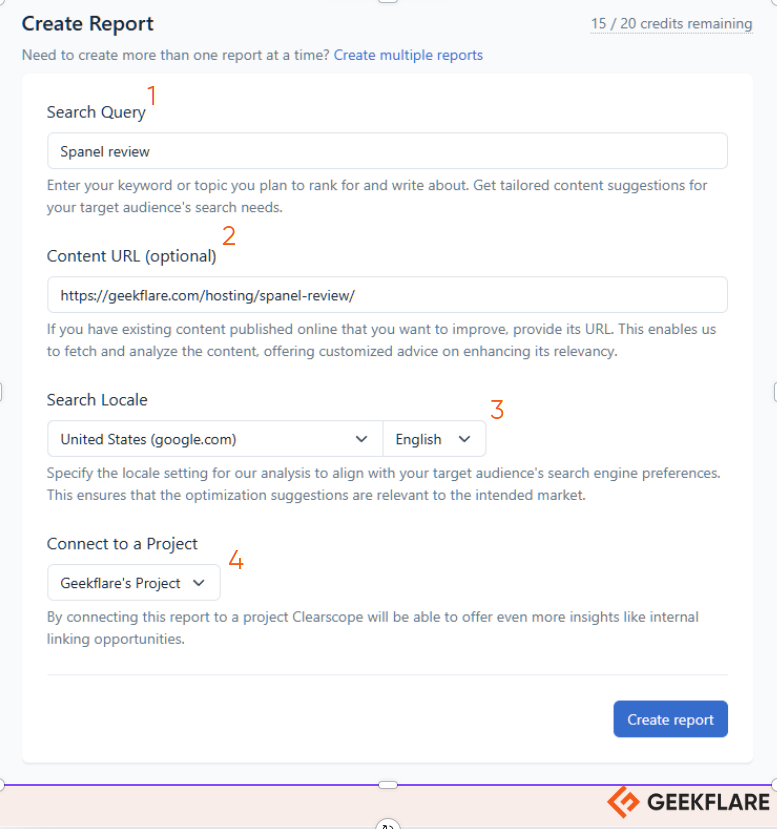
Now, you need to enter the following details:
- Search Query: Enter the target query.
- Content URL (optional): Enter the published content URL for optimization.
- Search Locale and language: Set the locale settings, including the United States (google.com), Canada (google.ca), and others. You can also choose from the 5 available languages, including English, German, Spanish, French, and Italian.
- Connect to a Project: Assign the report to an already-existing project.
Each report creation consumes 1 credit. The amount of available credit depends on your plan. For example, I subscribed to the Clearscope Essentials plan, which gives access to 20 credits.
In my case, it shows “17/20”, because I have already created 3 reports (each report takes 1 credit).
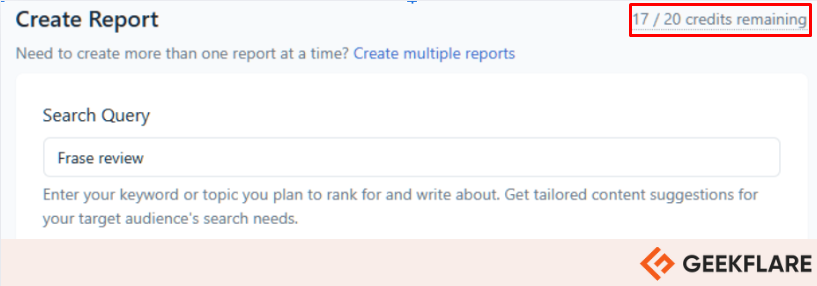
Caution ⚠️: Creating a report is an unreversible step that uses credits. If you make a mistake, your credits are lost. When I pointed out the issue during the product demo call, the Clearscope rep ensured that they refunded credits for genuine cases. All you need to do is contact their customer support.
After clicking on “Create Report”, Clearscope will take anywhere between 2-5 minutes for it to process.
During this process, it uses natural language processing (NLP) where it looks for key aspects, including:
- LSI Keywords: Understand contextual keywords. LSI stands for Latent Semantic Keywords.
- Suggested Headings: Lists headings from ranking topics.
- Term Map: How publications use the terms.
- Competitor Analysis: A visual representation of the competitor’s organic position.
- Content Grade: Improve content with proper guidance based on letter grades.
- Semantic Grouping: Recommends contextual-based semantic keywords.
Apart from report creation, Clearscope offers:
- Brief Templates
- Content Inventory
- Topic Research
I’ll cover all of these in detail in later sections. Keep reading!
ClearScope Product Offerings
In this section, I’ll briefly cover the 4 products that ClearScope offers. These are:
- Discover
- Optimize
- Write
- Protect
1. Discover
Clearscope’s discovery features remove any guesswork. It lets you search for:
- Accurate search volume
- Sub-topic suggestion from Google autocomplete
- Questions that searchers are asking
- Competitor’s insights
- Identify high-impact topics
Under the hood, it relies on Google Keyword Planner and Google Ads platform for the data.
Our in-house SEO team used it to only find inaccuracies in suggestions. The actual quote goes like this.
“As an SEO expert, I don’t like it due to the keywords it provides, because they’re inaccurate and far removed from what I searched for. For example, when looking for task management software-related keywords, I’m getting project management software-based keywords instead.”
– Vijay Singh Khatri, SEO Expert, Geekflare.
This is true, considering that Clearscope uses Google Keyword Planner data, which is not very accurate. According to Ahrefs, 91% of Google Keyword Planner’s search volumes are overestimating.[1]
However, there are positives as well, which I’ll discuss in detail in the features section.
2. Optimize
Clearscope Optimize lets you scrutinize already-existing published content using technologies such as IBM Watson, OpenAI, and Google Cloud.
Using this, content teams, freelancers, and agencies can build topical authority and showcase expertise and trustworthiness via E-E-A-T (Expertise, Experience, Authoritativeness, and trustworthiness).
During optimization, you get access to:
- Real-time content grade that provides instant feedback
- Citations to improve credibility and authority
- Popular questions that readers are asking
I found the Clearscope Optimize to genuinely improve content. It makes content more SEO-friendly with a high focus on readability and sharability. I’ll cover it in detail in “AI-powered Content Optimization” under the Features section.
3. Write
Clearscope lets you write content that ranks higher and impacts readers.
It fast-tracks and improves content creation quality by offering:
- AI outlines to help jumpstart content creation
- Competitor’s published content analysis
- Term recommendations for building tropical authority
- Microsoft Word, WordPress, and Google Docs integration
During the testing phase, I liked Clearscope as a writing aid. It offers essential terms to include, grades content, and provides research resources, including frequently asked questions.
4. Protect
Clearscope’s Protect offers continuous content monitoring. It helps in the following areas:
- Fixes content decay by keeping tabs on traffic, technical issues, and rankings
- Improves existing content by uncovering issues and providing recommendations like internal linking
- Helps keep content fresh and relevant in the long-term
Protect’s feature-set helps teams to keep up with ever-changing SEO and changes in topic information.
Clearscope Features
For demonstration purposes, I’ll use the “SPanel review” keyword (ranking on 1st page ) and “best php hosting providers“(ranking on 3rd page) to showcase Clearscope features.
Note: You can check my in-depth SPanel review and top PHP hosting provider posts.
The premise here is to see Clearscope’s recommendations for top-ranking posts vs. low-ranking posts.
AI-powered Content Optimization
I found Clearscope AI-powered content optimization to be its strongest suit. That’s because it provides visible cues on how to improve the piece of content, be it a content grade or understanding competitors via Term map or Competitors graph.
As mentioned in the “How Clearscope works” section, you need to create a report.
To see the report, you need to click on “Editor” (shown below).
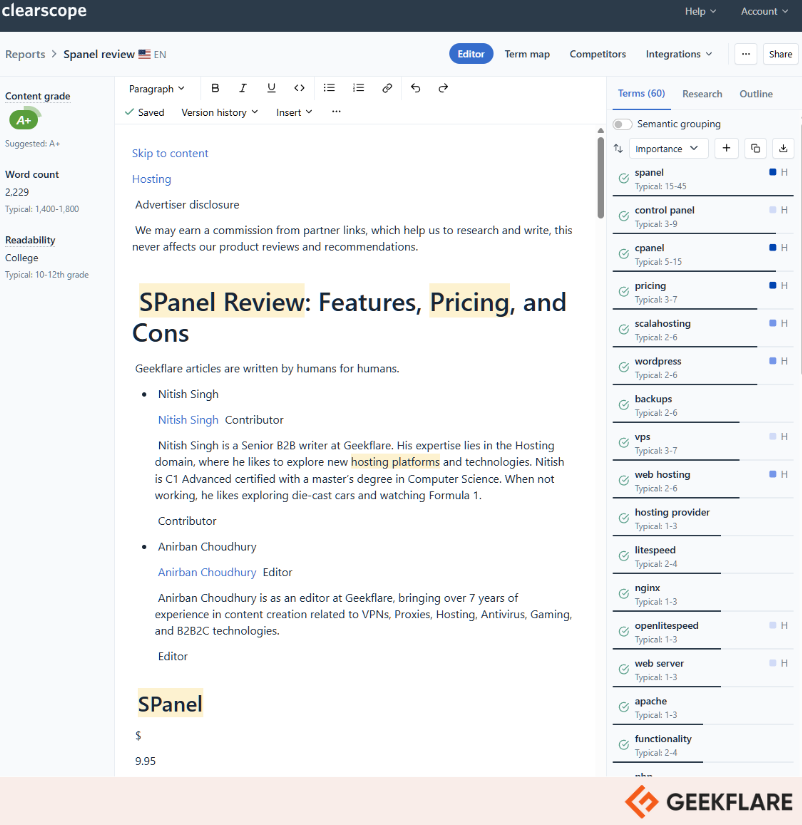
The “Terms” are the most important guide to follow. These are LSI keywords accumulated by analyzing the top 30 results.
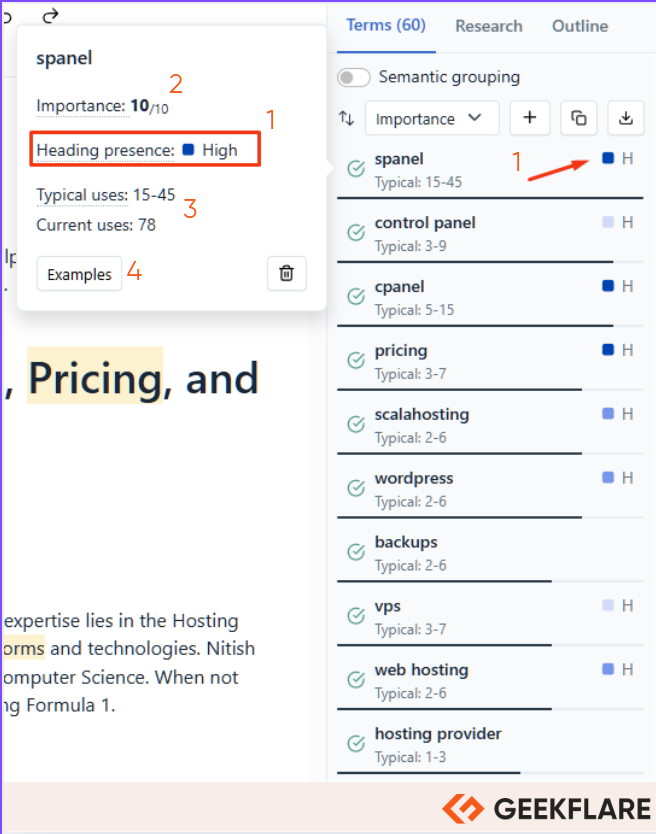
The key indicators for each term include:
- Heading presence: Denoted by an “H” letter with two different colors: Dark blue for high presence and light blue for low presence.
- Importance: Provides how relevant the keyword is for the content (1 to 10).
- Typical uses: Shows how often the term appears in the top search results.
- Examples: Provides terms usage examples in a new pop-up window.
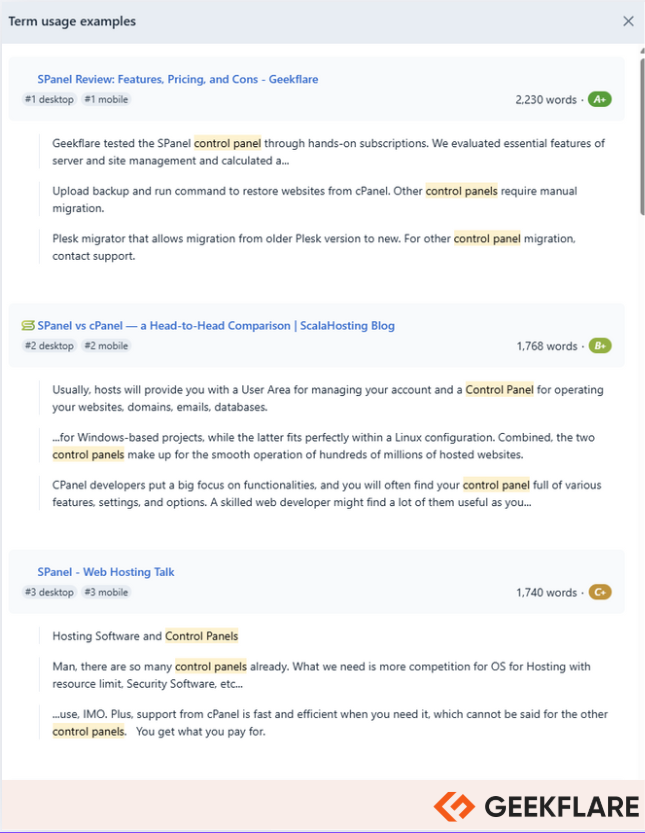
The Research tab provides lists the following:
- Questions: List of questions that help explore the topic related to the query. It gathers what people search from Google and also includes ChatGPT suggestions. It can be used in FAQs or other aspects of the content.
- Common citations: Lists the commonly cited resources listed in the top results.
- External resources: Links to Quora, Wikipedia, and Reddit links for easy research.
Lastly, Clearscope offers an Outline tab that lists the outline for all the top search results. It shows the headings in proper H1-H3 format.
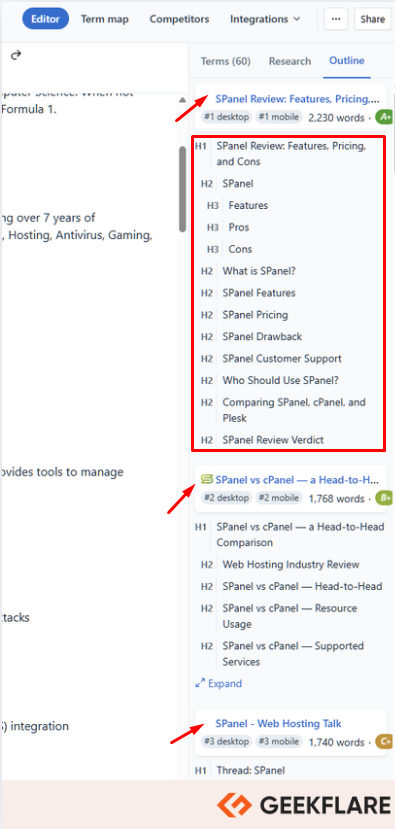
To guide, it shows the content grade rating, current ranking position (desktop and mobile), and the total number of words.
It is useful for teams that want to see what competitors are doing and get inspired to create something better.
Clearscope also offers AI outline creation. It is accessible from Insert > Generate Outline.
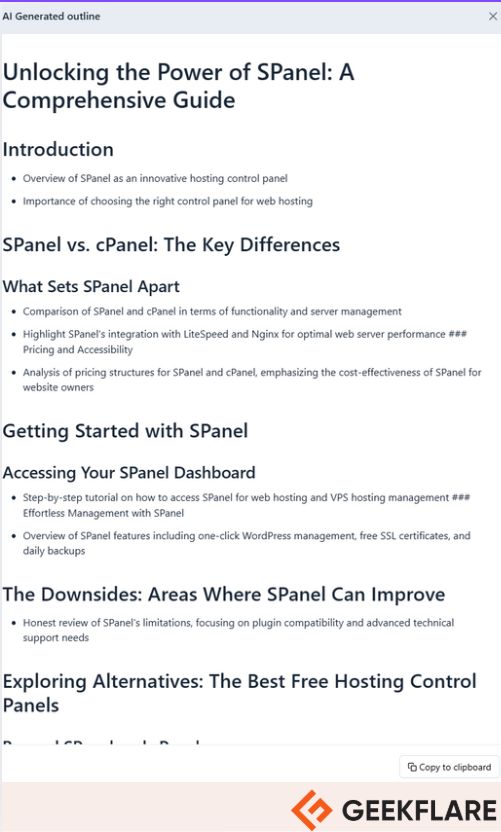
The outline opens in a new pop-up window, which you can copy and paste to the Editor.
I found the Outline creation process a little slow due to no drag-and-drop features. In comparison, Frase offers drag-and-drop features that make outline creation faster.
Overall, the Clearscope AI-powered content optimization is top-notch, offering plenty of ways to optimize and understand your content with respect to competitors. With it, you can find content gaps, keywords to include, and overall general guidance for improved ranking and outline creation.
Term Map and Competitors
For a more detailed comparison, Clearscope offers a Term Map. It lists all the terms on your draft and compares them to the competitors (for each of the top 30 results).
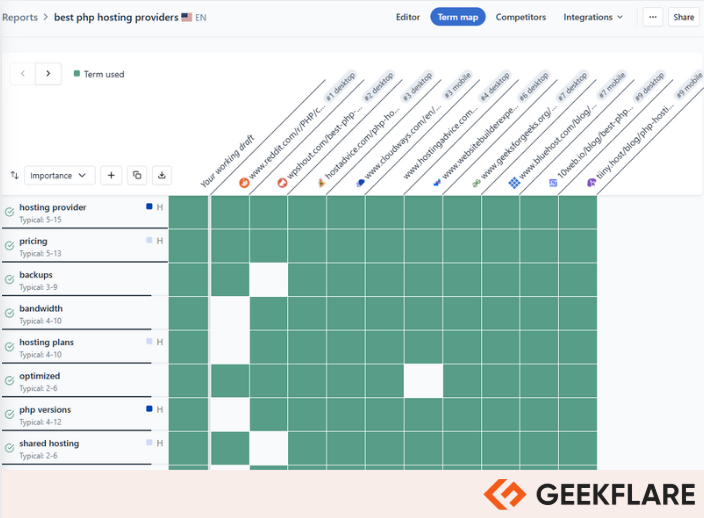
It helps identify content gaps or understand how competitors use terms to rank on Google.
The Competitor’s tab showcases your content position on Google relative to the competitors. It is well-designed, with worse rankings on the left and better ones on the right.
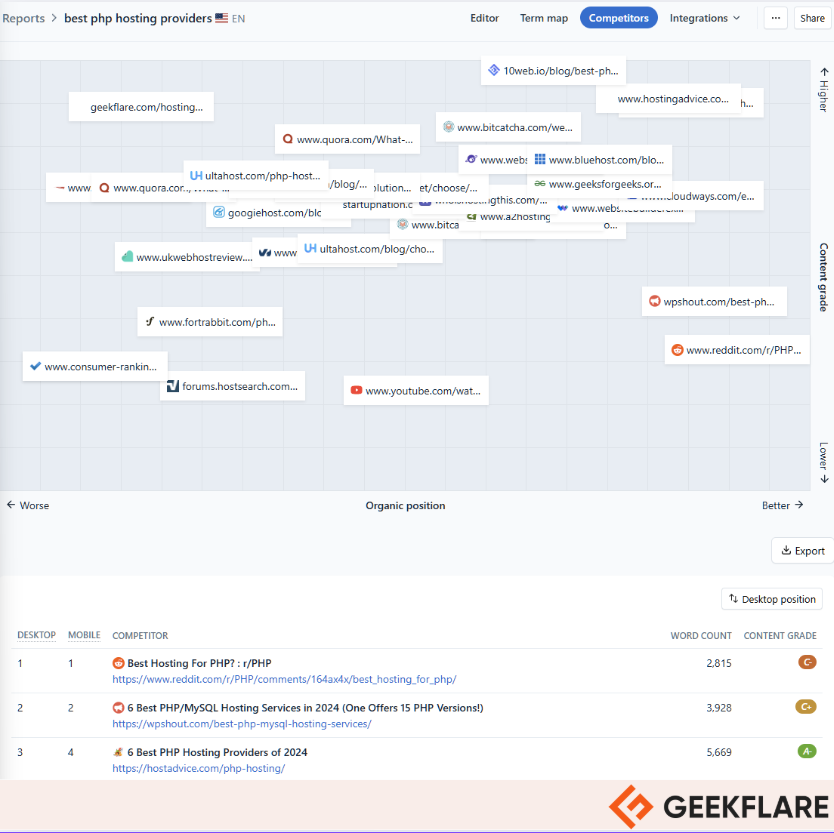
Content Grading System
Clearscope offers a content grading system to help write relevant content. It ensures content comprehensiveness by providing higher grades for content that covers relevant terms.
It works in real-time to keep you updated about your content. Additionally, you can use its integrations to work on Google Docs, WordPress, or even Microsoft Word.
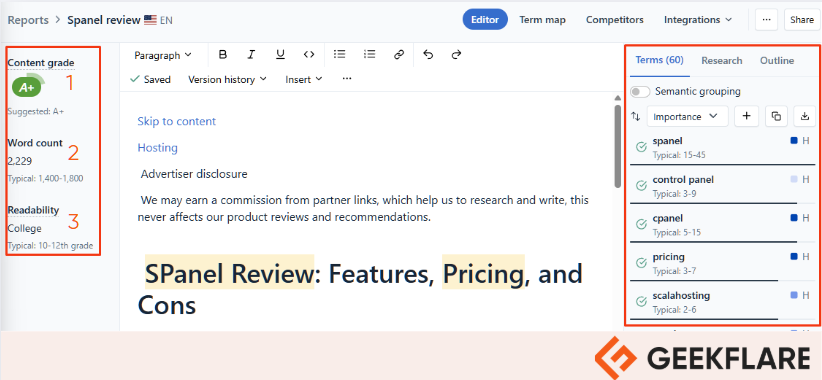
The content grading system has the following elements:
- Content grade: Grades content in the range of F to A++. Additionally, it offers suggested content grades for the topic you’re writing.
- Word count: Shows the current amount of words written. Moreover, it provides a hint on the range of word count. For example, the SPanel review is 2200+ words, while the typical word count ranges from 1,400 to 1,800.
- Reliability: Uses Flesch readability-ease test to provide readability grade level.
I found the Content Grade reliable as it relies on top-ranking Google articles. However, it acts as a “guide”.
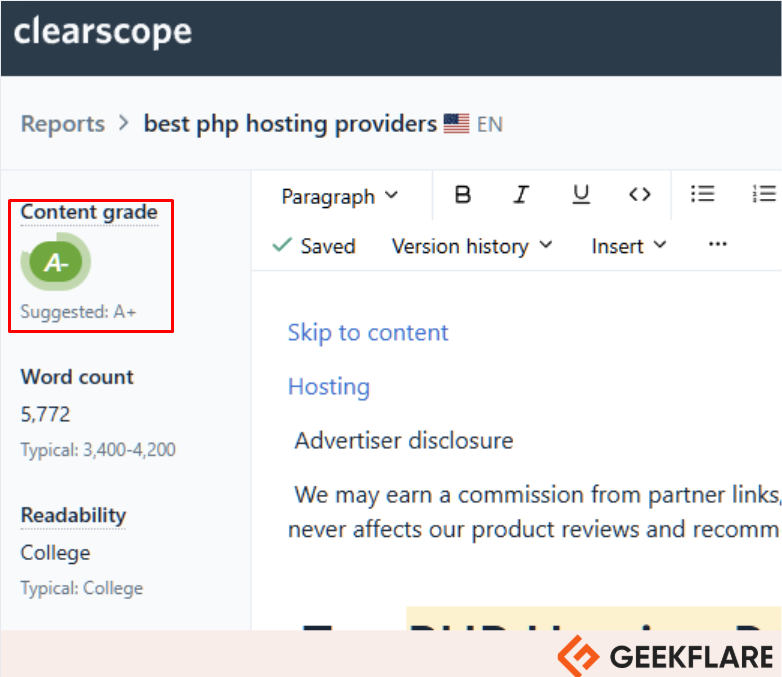
For PHP hosting providers, the content grade is “A-” which is suggested as “A+.” So, there is some correlation between content grade and ranking. However, that might not be the case for every content piece.
Semantic Keyword Recommendation
Clearscope provides Semantic grouping (available under the Terms tab). It groups related keywords based on context and helps you write semantic content (more accessible by search engines).
Once grouped, you’ll see specific keywords marked with different colors, simplifying identification and implementation.
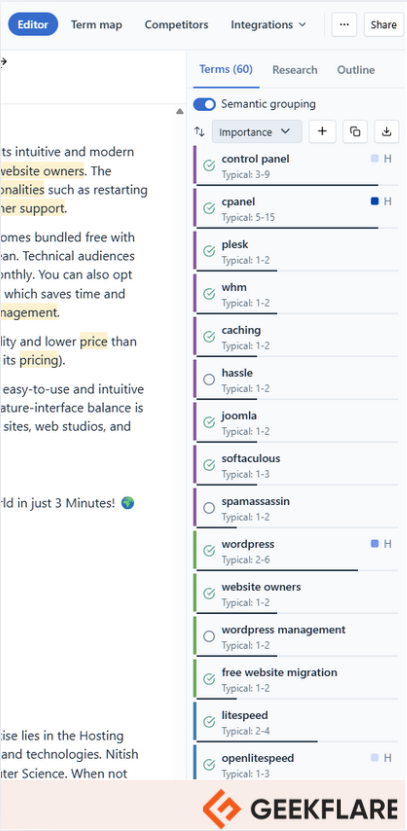
Content Inventory Management
Clearscope’s inventory management provides tools for easy content performance visualization, tracking internal linking, and monitoring content grades. For it to work, you need to connect to the Google Search Console.
It has 3 main sections:
- Analytics
- Pages
- Content Decay
Analytics is where you can learn about your content’s SEO value, Content Health, Impressions, and Clicks.
Content Health tracks major Google updates and captures how the changes impact traffic and overall content health. It allows businesses to keep up with Google updates and make content changes when needed.

However, it only works after you add the pages yourself (from the Pages section). It allows one-click import with the option to import all pages.
However, each Clearscope plan has a page allotment limit (for example, the Essentials plan has 100 content inventory pages). This makes it impractical to add all the pages. Businesses need to buy add-ons to overcome the limit.
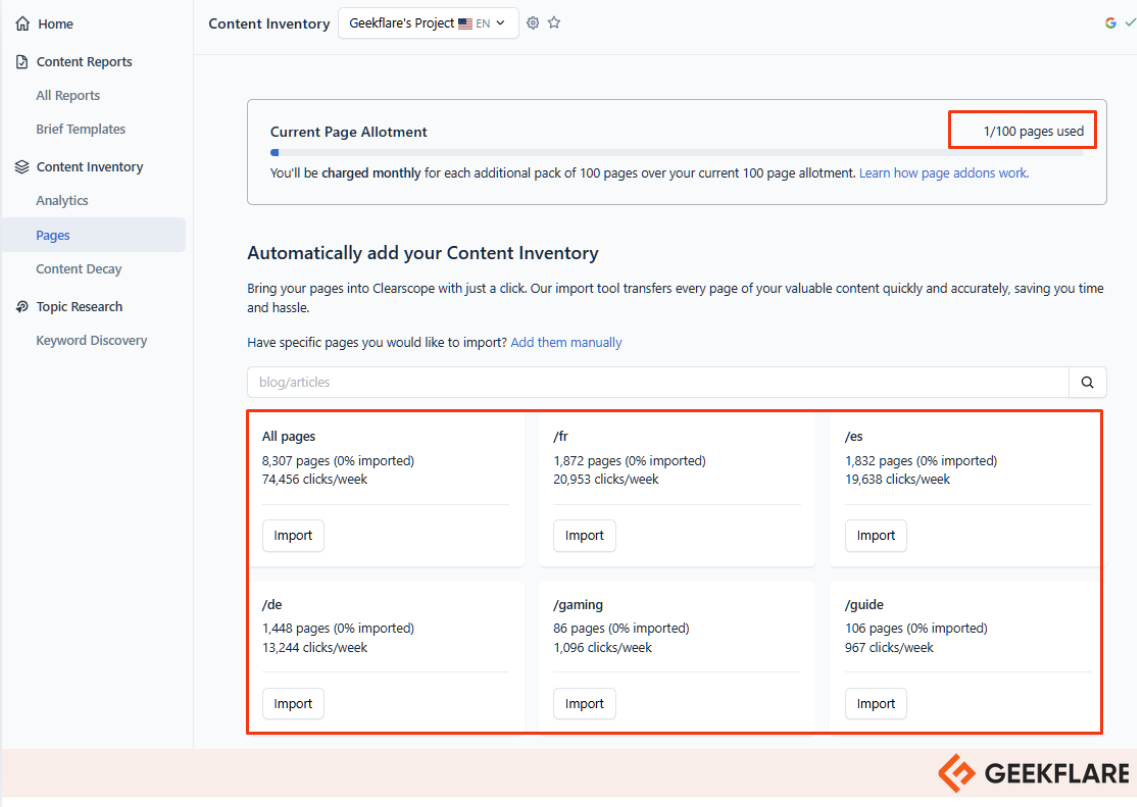
I started with importing Geekflare Tools manually. Next, I used their tool to test automated or one-click imports. In the search column, I added “/tools/” and clicked on search.
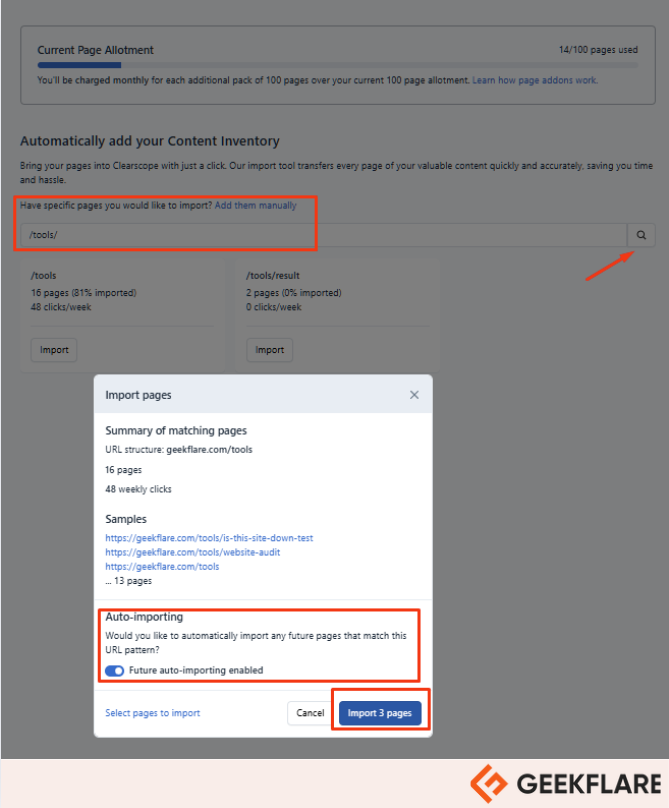
I liked its auto-importing feature, as it automatically adds any future pages for the said URL pattern.
Once imported, you can see all the pages with proper grade, target query, and number of clicks in the last 7 days.
It also provides a list of filtering options, including:
- Title
- URL
- Tag
- Content grade
- Target Query
- 7-day clicks
Furthermore, you can create a report directly from the page to optimize it.
Note: You can manually change the target query if the tool lists it wrongly.
The real power of Content Inventory is “Content View”. It provides pre-defined content views such as:
- Best Opportunities: Pages with a higher chance to rank on Google
- Internal Linking: Suggest pages with internal ranking potential
- Technical Issues: List technical issues with the pages
- Striking Distance Queries: Articles with the potential to rank that currently rank on page 2 or below.
And many more.
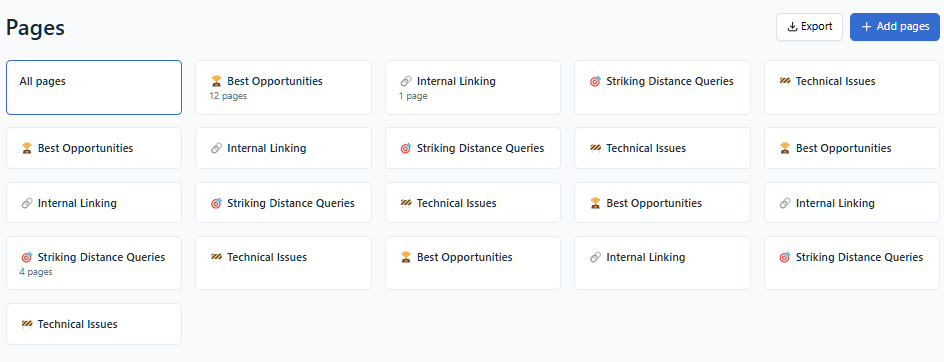
However, the best part is that you can create your own custom view by choosing the filter. For example, at Geekflare, we cover different B2B product categories. It can be project management tools, cybersecurity tools, and so on.
By using content view, blogs that cover a specific topic or target a particular audience can be captured, monitored, and improved for the best SEO results over a longer period of time.
I tested the features by importing 77 pages of Geekflare’s cybersecurity articles. After that, I set the URL filter to “https://geekflare.com/cybersecurity/” and get all the cybersecurity articles listed. Then, I went forward and clicked on “Save Content View”.
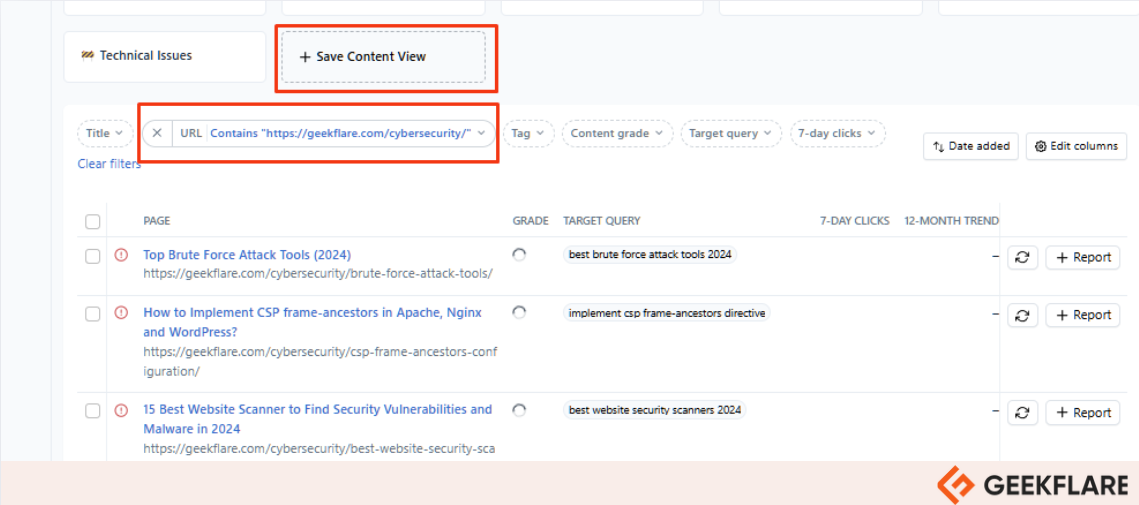
I loved the possibilities that Content Inventory offers. It’s all up to how businesses use the feature to improve their SEO journey.
Keyword Discovery
Clearscope’s Keyword Discovery lets you discover and research keywords. It enables you to target Google top-level domains and select keywords.
As mentioned above, Keyword Discovery relies on Google Search Console data, which is not that accurate.
For example, when I search for the “Clearscope review” keyword, it outputs some unnecessary keywords.
To search, you’ll need to enter a Query and select the Google top-level domain and language. Once done, click on Run to get the suggestions.
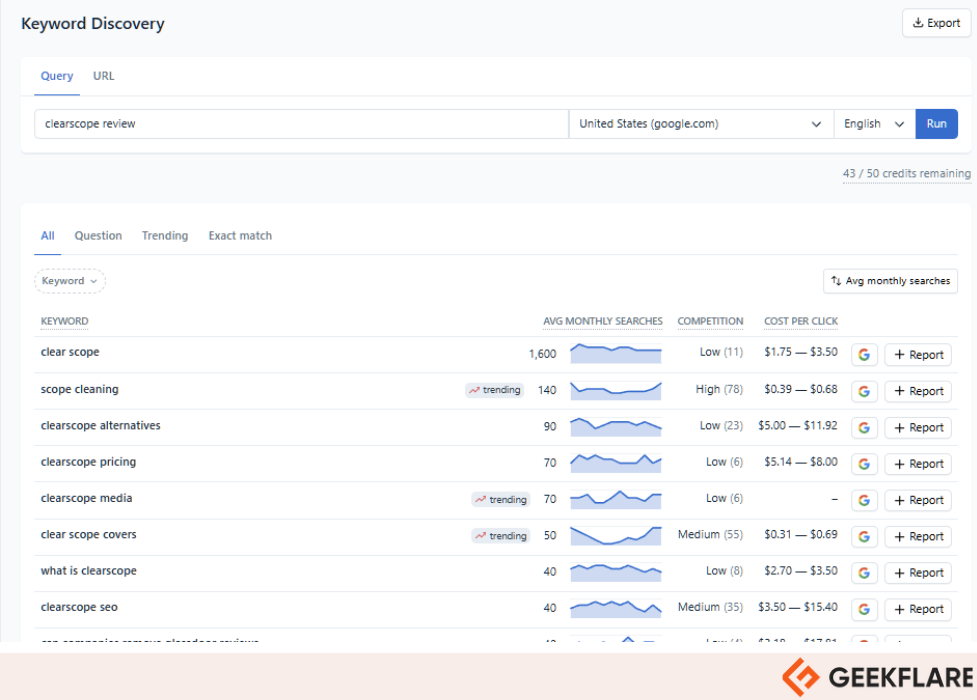
You can also do an exact keyword search by selecting Keyword > Contains > and then entering the term you’re searching for.
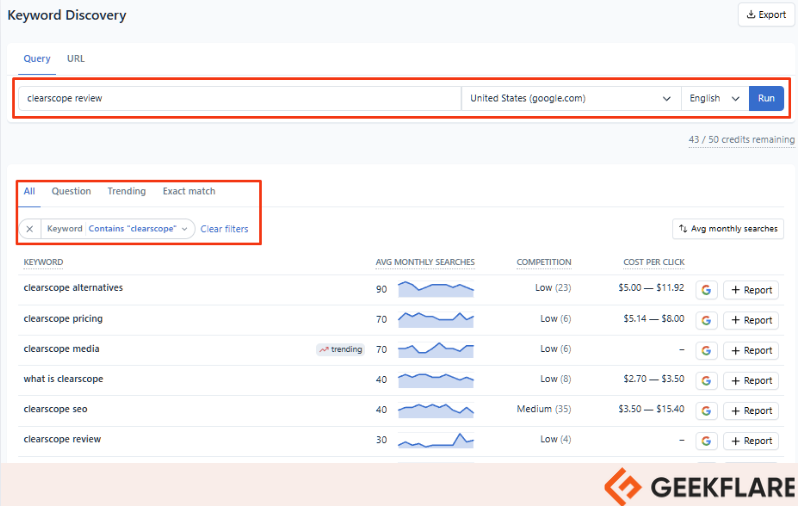
Additionally, it also offers the following tabs:
- Questions: Learn which questions are asked related to the term
- Trending: Provides the trending keyword list
- Exact Match: Get exact term info, including avg. monthly search
This feature is best for small businesses that are just starting out. It aids research, content development, and optimization. However, it’s best to stick to reliable tools like Ahrefs for medium to large-scale businesses.
Clearscope Use Cases
Clearscope has many use cases. However, I found it best for:
- Content optimization
- Website content creation
- E-Commerce product descriptions
- Agency content workflows
- Freelance writing projects
Let’s discuss each one of them in detail.
1. Content Optimization
Clearscope’s content optimization can help you:
- Write optimized content from scratch
- Optimize old/already-published content
It improves chances of better search engine rankings and reader engagement.
Clearscope analyzes the top 30 search results and provides data-driven recommendations.
For example, it lists the LSI keywords with semantic grouping, helping content creators to write relevant contextual content.
To guide, it offers real-time content grade, access to common citations, and commonly asked questions.
2. Website Content Creation
Clearscope can help identify and optimize website content via its Keyword Discovery tool and optimization options.
The platform can help you write high-quality content that converts visitors and ranks well in search engines.
Furthermore, businesses can use Content Inventory tracking to keep tabs on all the website content pages.
3. E-commerce Product Descriptions
Clearscope lets e-Commerce players write product descriptions that convert well. It ensures simplicity with a focus on features and benefits.
Plus, it provides relevant terms to include with semantic grouping options.
4. Agency Workflows
Agencies can utilize Clearscope to handle and manage client’s requirements in a streamlined manner. They can optimize content, create content briefs, get real-time benefits, collaborate internally and externally, perform competitive analysis, and more.
The idea is to create content with a focus on conversion. Moreover, Clearscope’s Inventory Management makes it easy to keep track of clients’ pages and improve them over time.
5. Freelance Writing Projects
Freelancers can use Clearscope to write top content for search engines with a data-driven approach. It helps improve the work quality and deliver faster results.
5 Benefits of Using Clearscope for Content Success
I found Clearscope to offer 5 benefits, which are:
- Ease of Use: Clearscope offers an intuitive interface enabling anyone, including new users, to adopt and utilize the platform to its full potential.
- Enhanced Content Quality: Clearscope improves content quality via proper data-driven recommendations. It helps identify content gaps and offers excellent content improvement suggestions.
- Improved SEO Rankings: The improved content quality can boost search rankings, as Google prefers highly readable and engaging content. Clearscope’s competitor analyzing SEO tools and semantic suggestions ensure that you publish content that’s easy for the crawler to understand and that you don’t miss out on any important aspects for a specific topic.
- Team Collaboration: Clearscope has no user limits, which opens up team collaboration. Moreover, Clearscope reports are available to anyone outside the organization with full capabilities to work with them.
- Integrations: Improves workflow with integration support for Google Docs, WordPress, and Microsoft Word.
Clearscope Pricing
Clearscope offers 3 plans:
- Essentials: Ideal for startups, freelancers or agencies
- Business: Ideal for small to medium-sized businesses
- Enterprise: Ideal for enterprises with custom requirements
| Plan | Price (Per Month) | Key Features |
|---|---|---|
| Essentials | $189 | 100 content inventory pages, 50 monthly keyword discoveries, 20 monthly content reports |
| Business | $399 | 300 content inventory pages, 50 monthly keyword discoveries, 20 monthly content reports, Dedicated account manager |
| Enterprise | Custom Pricing | Custom credits, Custom agreements, Crawler whitelisting, Single sign-on (SSO) |
Each plan comes with:
- Free training and onboarding
- Priority support
- Unlimited sharing & exporting
- Flexible plan changes when needed
- Unlimited users and projects
Clearscope also offers the following addons:
- Pages: Starting at $25/mo (Essentials) and $15/mo (Business) for 100 additional pages.
- Reports: Starting at $100 (Essentials) and $30 (Business) for 10 additional reports.
Remember💡: You can cancel your plan anytime. However, they don’t offer any money-back guarantee or a free trial.
Pros and Cons of Clearscope
During my time with Clearscope, I found the platform to be advantageous for small agencies and businesses. However, it had some disadvantages which are worth noting.
Let’s start with the advantages of Clearscope.
Clearscope is an easy-to-use platform with intuitive UI/UX. It keeps things simple and accessible with minimal elements on your screen. However, I did find the term “report” a bit confusing during my initial exposure to Clearscope. I believe that it should follow Frase’s footsteps by terming it as a “document”.
Additionally, I found Clearscope’s onboarding excellent. The account manager from Clearscope spent an hour explaining each feature in detail and cleared my doubts instantly. Moreover, they sent me the recording of our demo so that I could recap things when required.
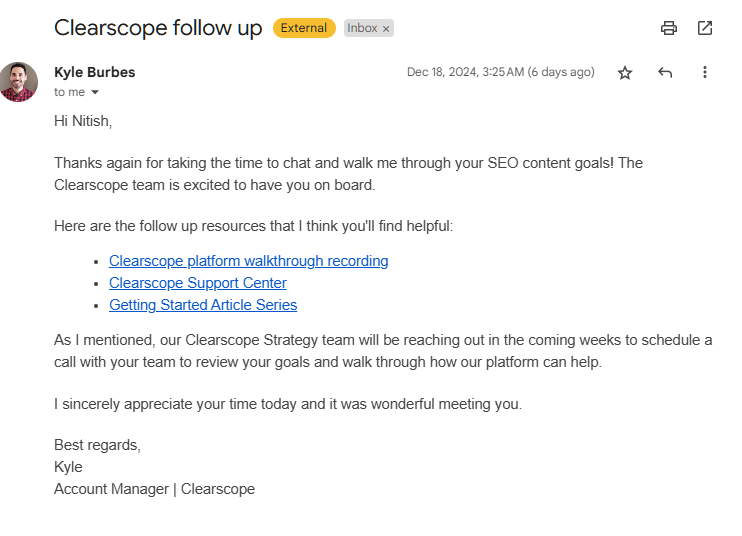
As for functionality, Clearscope offers strong reports with clear guidance on how to write or improve content. Its content grade is on point, based on content relevance and comprehensiveness.
It lists the LSI terms from the top 30 results and even offers semantic grouping for semantic writing.
However, what makes Clearscope unique is its Content Inventory feature. It helps businesses to keep tabs on content and learn how it is performing over time.
Furthermore, teams can configure Content View to track specific content sets or use the available Content Views, such as Best Opportunities, Striking Distance Queries, and more.
To summarize, Clearscope’s pros include:
- Intuitive UI/UX
- Excellent onboarding
- Powerful NLP with consistent guides
- No user limit on plans
- Easy collaborative features
- AI-optimized outline creation
- Real-time content grading
- Semantic grouping
- Monitoring published content via the Content Inventory
- Useful pre-defined Content Views
As for cons, Clearscope lacks a drag-and-drop feature during outline creation—which can impact productivity. I like the credit system, but I think the allowed credits are too low for any of the available plans. This limits the scope of experimentation as SEO teams need to carefully decide which pages they want to create reports on. The plans are also costly and not ideal for small businesses.
To summarize, Clearscope’s cons include the following:
- No drag-and-drop feature for outline creation
- Low allotted credits for plans
- Costly plans, not value for money
- Unreliable keyword discovery feature
Clearscope Integration
To improve workflow, Clearscope provides 3 integrations:
- Google Docs
- WordPress
- Microsoft Word
Google Docs
To use Clearscope on Google Docs, you must install its browser extension. Once installed, you can access it by going to Extensions> Clearscope > Start.
It’ll then ask you to link a shared report.
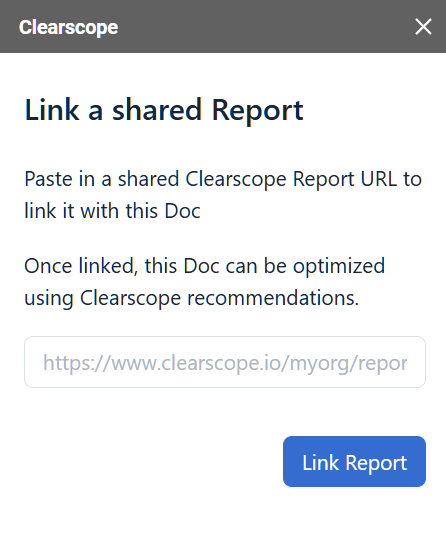
Then, it’ll open up a side panel offering all the necessary information and tools.
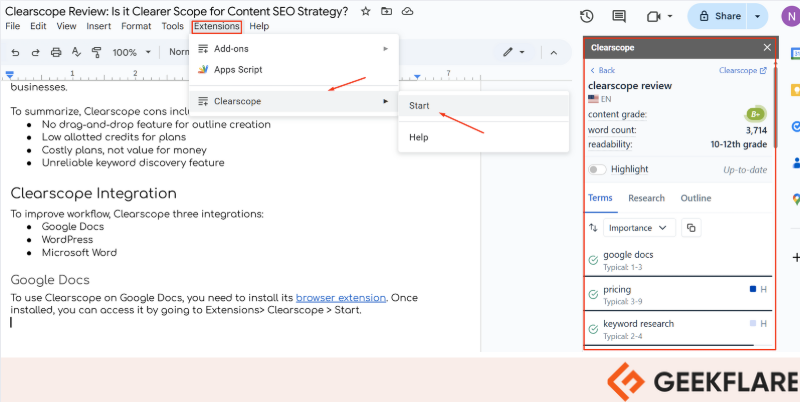
WordPress
Clearscope WordPress addon also works similarly. You need to install the Clearscope WordPress plugin, which you can use directly from the WordPress post.
Microsoft Word
Clearscope’s Microsoft Word integration works well with most Word versions. Once integrated, it provides recommendations, content grade, terms list, and word count in real-time.
Clearscope Support
Clearscope provides support via its knowledge base and email. The email support is available Monday through Friday, 7 AM to 6 PM CST. There is no 24/7 customer support option, and they also don’t provide phone support.
Clearscope responds to emails within 24 hours. However, the actual response time is much faster. They took 1.5 hours to provide a detailed response to my ticket.
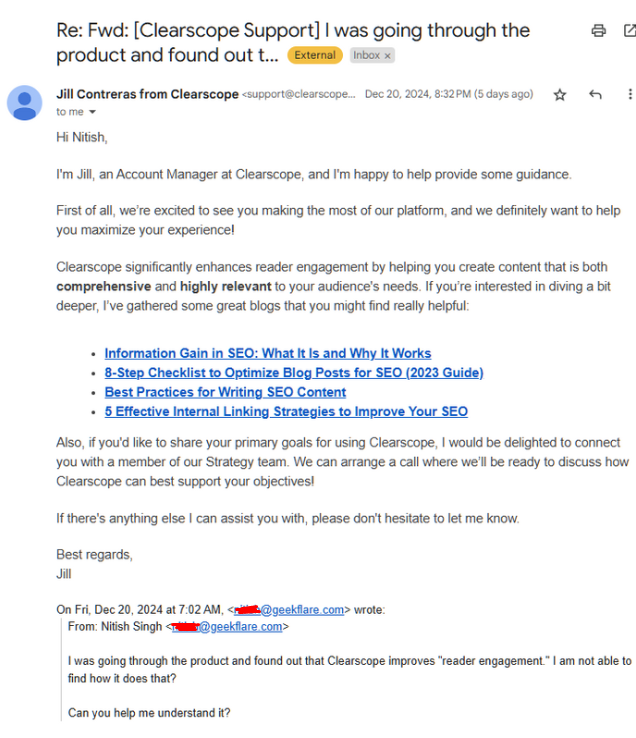
Clearscope Alternatives
Clearscope has many viable alternatives, including:
- SurferSEO
- Frase
- MarketMuse
In the table below, I’ve compared Clearscope with SurferSEO, Frase, and MarketMuse based on their monthly starting price, features, and value for money.
 |  | 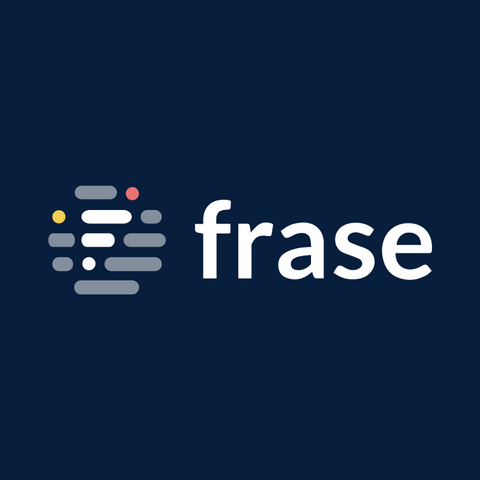 |  | |
$189 | $79 | $45 | $99 | |
Term Map, AI-powered content optimization, Semantic keyword recommendation, content inventory management | Good AI integration, Topical maps, keyword research, humanizing content, Jasper integration | Excellent AI integration, SERP analysis, 20+ language support, outline builder, Competitive Intelligence | On-demand inventory, personalized metrics, comprehensive research, topic authority and content cluster analysis | |
Less value for money due to expensive plan pricing | Better value for money compared to Clearscope as per report cost is less | Better value for money compared to Clearscope due to excellent features at low price | Better value for money compared to Clearscope with similar feature set | |
Geekflare’s editorial team determines ratings based on factors such as key features, ease of use, pricing, and customer support to help you choose the right business software. | ||||
SurferSEO
SurferSEO is a popular content optimization platform. It stands as a solid alternative, especially if you’re looking for cheaper pricing. Both offer WYSIWYG (What You See Is What You Get). Unlike Clearscope, SurferSEO offers an auto-optimization option.
However, both of them use NLP to suggest terms for establishing authority. They also offer good collaboration options. As for integration, SurferSEO and Clearscope are equally matched with support for Google Docs and WordPress.
Overall, both provide a good feature set, with SurferSEO offering better AI, SERP analysis, and support for 11 languages. In contrast, Clearscope provides good report-sharing capabilities, real-time updates, and content inventory.
Frase
Like SurferSEO, Frase has excellent AI integration that aids outline creation and writing. It offers more language support (20+) compared to just 5-language support for Clearscope.
I like Frase’s workflow and ability to create SEO workflow, blank documents, or AI article wizard. The drag-and-drop feature is also handy during outline creation. Furthermore, it has real-time content grading.
Frase is recommended for users who only need content optimization. Its pricing plans are also very competitive, starting at just $45/month.
MarketMuse
MarketMuse is a great alternative to Clearscope as it offers robust features like on-demand inventory, personalized metrics, comprehensive research, topic authority, and content cluster analysis. Like Clearscope, MarketMuse also uses AI to fetch, analyze, and make recommendations.
The platform’s pricing is cheaper than Clearscope’s, while offering a similar or, in some cases, better set of features.
Additionally, MarketMuse provides a content strategy document that lets teams collaborate and create effective strategies to rank their content higher on search engine pages.
Who Should Use Clearscope?
Clearscope is best suited for:
- Small to Medium Business Owners: For easily creating and optimizing website and blog content, but costs more depending on the number of reports created.
- SEO Professionals: Enabling them to do keyword research and create outlines for writers.
- Content Marketers: Helping them strategize content marketing efforts that focus on driving organic traffic.
- Agencies: Streamlining the content creation process and SEO efforts by correctly identifying keywords and creating content with guided scores. They also get excellent content inventory features to manage content for different clients.
- Consultants: Help analyze competitors’ content and identify content gaps to take relevant actions for the client.
- Enterprises: Businesses with large teams that want unlimited seat access can use Clearscope for their content optimization needs. Unlike Frase, Clearscope does not charge via a pay-per-seat model.
Who Shouldn’t Use Clearscope?
There are scenarios where Clearscope isn’t suitable:
- Users With a Limited Budget: Clearscope’s basic plans are costly, which makes it undesirable to businesses with small budgets.
- Users Who Only Need Content Optimization: Clearscope’s high pricing can be attributed to its wide range of features. So, users with only content optimization should try out other alternatives, such as Frase.
- Non-English Content Creators: Clearscope has limited language support, so users who require advanced semantic recommendations in languages other than English should avoid it.
Clearscope Ratings and Recognition
| Platform | Rating |
|---|---|
| TrustPilot | 4.5/5 (16,000+ reviews) |
| TrustRadius | 8.1/10 |
| G2 | 4.9/5 (90+ reviews) |
| Capterra | 4.9/5 (60 reviews) |
| Geekflare | 4.0/5 |
Clearscope Verdict
Clearscope is an excellent AI-powered SEO content optimization tool. It fits the needs of varied users, including freelancers, agencies, consultants, SEO professionals, and small to medium-scale businesses.
First-time users will find Clearscope easy to use with its intuitive dashboard. The smooth onboarding process makes it even easier to get started.
Clearscope scores very well in 2 departments: content optimization and content inventory.
With access to data-driven grading, terms, and NLP-powered suggestions, teams can create high-quality SEO-optimized content. It can help businesses show authority with a focus on increasing readability scores and engagement.
So, does it live up to the hype? Yes, it does.
Its popularity is backed by solid features directly impacting content creation, optimization, and discovery.
However, it can improve in 2 departments: keyword discovery and value for money.
In comparison, Frase offers a streamlined content optimization workflow and value-for-money plans.
Clearscope receives the Geekflare Innovation Award for providing tools to grade, optimize, create, and track content. Its clean design welcomes new users while still offering advanced features. While its plans can be expensive if you’re working on multiple projects, smaller ventures will find everything they need neatly packaged into a quick and easy platform.
References
-
 EditorAnirban Choudhury is as an editor at Geekflare, bringing over 7 years of experience in content creation related to VPNs, Proxies, Hosting, Antivirus, Gaming, and B2B2C technologies.
EditorAnirban Choudhury is as an editor at Geekflare, bringing over 7 years of experience in content creation related to VPNs, Proxies, Hosting, Antivirus, Gaming, and B2B2C technologies.


